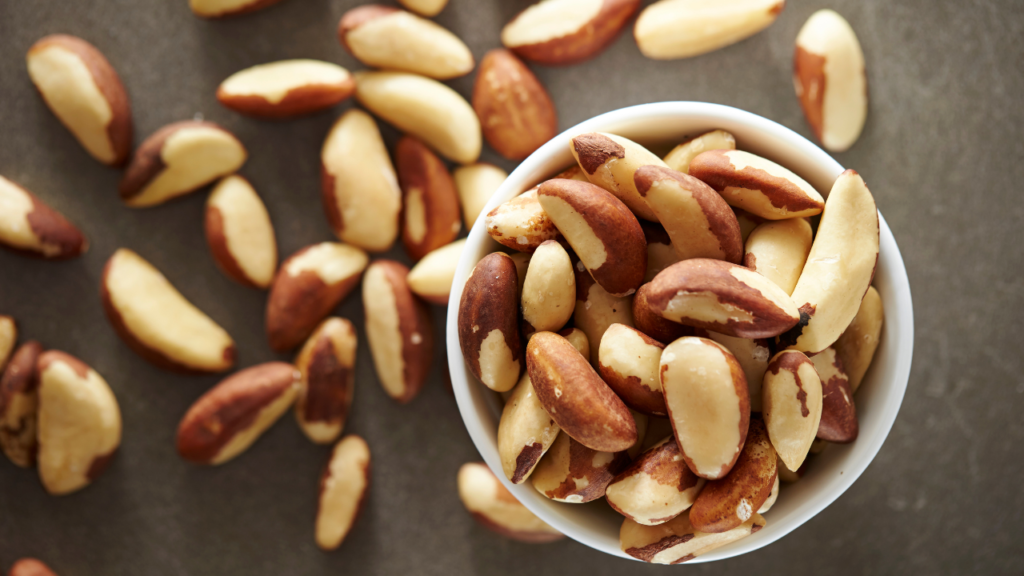Brazil Nuts

Brazil nuts are large edible seeds that come from the Brazil nut tree, scientifically known as Bertholletia excelsa. These nuts are native to the Amazon rainforest in South America and are named after Brazil, although they can also be found in other countries like Bolivia and Peru.
Here are some key characteristics and facts about Brazil nuts:
- Appearance: Brazil nuts are typically round or oval-shaped, with a hard, woody shell that needs to be cracked open to access the edible kernel inside.
- Size: They are one of the largest nuts available, usually measuring around 1-2 inches (2.5-5 cm) in diameter.
- Flavor and Texture: Brazil nuts have a rich, creamy flavor with a hint of sweetness. They also have a slightly crunchy and firm texture.
- Nutritional Value: Brazil nuts are highly nutritious and are a good source of healthy fats, protein, fiber, vitamins, and minerals. They are particularly known for their high selenium content, which is an essential mineral that plays a crucial role in antioxidant defense and thyroid function.
- Health Benefits: Consuming Brazil nuts in moderation can provide several health benefits. The selenium in Brazil nuts supports the immune system, promotes thyroid health, and acts as an antioxidant. They also contain other nutrients like magnesium, phosphorus, zinc, vitamin E, and vitamin B6, which contribute to overall well-being.
- Heart Health: The healthy fats present in Brazil nuts, such as monounsaturated fats and polyunsaturated fats (including omega-3 fatty acids), can have a positive impact on heart health. These fats help lower LDL (bad) cholesterol levels, reduce inflammation, and improve blood lipid profiles, thereby reducing the risk of heart disease.
- Brain Function: The presence of omega-3 fatty acids in Brazil nuts can benefit brain health. Omega-3s are essential for the proper functioning of the brain and may help improve cognitive function, memory, and overall brain health. Anticancer Potential: Some studies suggest that the selenium content in Brazil nuts may have anticancer properties. Selenium is thought to help protect against certain types of cancer by reducing oxidative stress, supporting DNA repair, and enhancing immune function. However, more research is needed to fully understand the relationship between selenium and cancer prevention.
- Culinary Uses: Brazil nuts are often enjoyed as a snack on their own, but they can also be used in various culinary preparations. They are commonly added to trail mixes, baked goods like cookies and cakes, granolas, and desserts. Brazil nut oil, extracted from the nuts, is sometimes used in cooking and as a natural moisturizer.
- Harvesting: Brazil nuts are harvested from the Brazil nut tree, a tall and impressive tree that can reach heights of up to 50 meters (165 feet). The nuts grow in a large, spherical fruit capsule that weighs several pounds. These capsules are collected from the forest floor after they naturally fall from the trees.
- Sustainability: Brazil nut harvesting is often carried out by local communities in the Amazon rainforest. This practice helps support the preservation of the rainforest as an important ecosystem, as it provides economic incentives for conservation.
It’s worth noting that some individuals may have allergies or sensitivities to Brazil nuts. If you have any concerns or specific dietary needs, it’s always a good idea to consult a healthcare professional.

Brazil nut oil is a vegetable oil extracted from the seeds of Brazil nuts. It is commonly used in cooking, skincare products, and as a dietary supplement. Here’s more information about Brazil nut oil:
Extraction: Brazil nut oil is extracted by cold-pressing the seeds of Brazil nuts. Cold pressing involves applying pressure to the nuts without the use of excessive heat or chemicals, which helps to preserve the natural properties of the oil.
Composition: Brazil nut oil is rich in monounsaturated fats, particularly oleic acid, which is known for its heart-healthy benefits. It also contains smaller amounts of saturated fats and polyunsaturated fats. Additionally, Brazil nut oil contains various vitamins and minerals, including vitamin E, vitamin B, selenium, magnesium, and zinc.
Nutritional Benefits: Brazil nut oil provides several nutritional benefits. It is a good source of healthy fats, which can support cardiovascular health and help reduce inflammation in the body. The oil also contains vitamin E, an antioxidant that protects cells from damage caused by free radicals.
Culinary Uses: Brazil nut oil has a delicate and nutty flavor, which makes it suitable for various culinary applications. It can be used as a dressing for salads, drizzled over cooked vegetables, or as a finishing oil for dishes. Due to its high smoke point, it can also be used for sautéing and frying.
Skincare and Haircare: Brazil nut oil is often used in skincare and haircare products due to its moisturizing and nourishing properties. It is believed to help improve skin elasticity, promote a youthful appearance, and provide hydration. The oil is also used in haircare products to condition and add shine to the hair.
Dietary Supplement: Brazil nut oil is sometimes consumed as a dietary supplement due to its high selenium content. Selenium is an essential mineral that supports various bodily functions, including immune system health and antioxidant defense. However, it’s important to consume Brazil nut oil in moderation, as excessive intake of selenium can have adverse effects.





